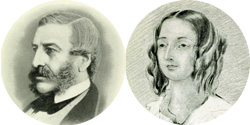William Henn facts for kids
Quick facts for kids
William Henn
|
|
|---|---|
| Born | 1720 Clare, Ireland
|
| Died | 1796 (aged 75–76) Dublin, Ireland
|
| Education | University of Dublin |
| Occupation | Judge |
| Spouse(s) | Elizabeth Parry |
William Henn (around 1720 – 1796) was an Irish judge. He is mostly remembered today for a funny, but perhaps a bit mean, story written about him. This story was shared by another judge, Sir Jonah Barrington, in his book Personal Sketches.
Contents
Early Life and Career
William Henn was born in a place called Ballynacally, County Clare, in Ireland. He was the second son of Thomas Henn. His family, the Henns, originally came from London. They had bought a lot of land in County Clare in the 1600s.
The Henn family had a long history of working in law. An ancestor, Henry Hene, was a very important judge called the Chief Baron of the Irish Exchequer. This was from 1680 to 1687. William Henn's cousin, John Bennett, also became a judge. They even worked together later on.
Becoming a Judge
William Henn started studying law in 1738 at a famous place called Middle Temple. He then earned his degree from Trinity College Dublin in 1740. By 1744, he became a lawyer, which is called being "called to the Irish Bar".
He became a King's Counsel in 1762. This means he was a very experienced and respected lawyer. In 1768, he was made a judge in the Court of King's Bench (Ireland). He served as a judge until 1791. William Henn passed away in Dublin in 1796.
What People Thought of Him
Sir Jonah Barrington, the judge who wrote about William Henn, said he was a "very excellent private character." This means he was a good person in his personal life. However, Barrington did not think he was a very good judge.
A Puzzling Case
Barrington shared a story about Judge Henn. It happened around 1789 when Henn was hearing cases in Wexford. Two young lawyers were arguing their cases. Both of them spoke very well and made strong points for their clients. They both said the law was on their side.
After listening for a long time, the lawyers asked Judge Henn to make his decision. Judge Henn was very confused. He didn't know which lawyer was right. He quietly asked his assistant, called a registrar, "I wish to God I knew what the law really was!" The registrar replied that if he knew, he would gladly tell the judge. This story shows that Judge Henn sometimes struggled with complex legal decisions.
Other Opinions
Another important judge, John Scott, 1st Earl of Clonmell, had a very low opinion of William Henn. Scott was the main judge in the King's Bench where Henn worked. He even wrote in his private journal that Henn was "at best a fool."
It's important to know that Scott often wrote negative things about almost all the Irish judges of his time. He even criticized judges he seemed friendly with in public. For example, William Henn's cousin, John Bennett, was someone Scott saw as an enemy.
His Family
William Henn married a woman named Elizabeth Parry. We don't know much about her family. They had three daughters and one son, who was also named William Henn. This younger William also became involved in law, working as a Master in Chancery.
The younger William Henn married Susaana Lovett. They had six children. One of their children was Jonathan Henn, who became a lawyer too. Jonathan Henn is known for prosecuting a famous case against John Mitchel.
A very famous musician and composer, Sir Charles Villiers Stanford, was also a descendant of William Henn. Stanford was the son of Jonathan Henn's sister, Mary. Mary was known as a charming and polite lady. She married John James Stanford.
 | Percy Lavon Julian |
 | Katherine Johnson |
 | George Washington Carver |
 | Annie Easley |


